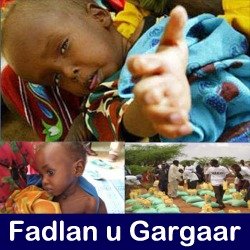By Ali Ghedi
Somalia has been through a difficult time in the last 21 years Rivalry between clan faction leaders has led to killing, starvation and dislocation until 2006, when the Islamic Courts Union took control of Mogadishu and nearly all of Southern Somalia. Unfortunately, thanks to the interference of Ethiopian forces with the blessing of the United States, the ICU couldn’t last more than six months.
After 21 years and more than 14 peace conferences, Somalia is still without a stable national government and it will never get one in the near future unless the United Nations demands that the international community stop interfering in Somalia’s affairs politically and militarily.
In order to achieve a lasting peace in the region, the international community must stop meddling of the internal affairs of Somalia. The world should know that Somalis are homogenous; they share the same language, culture and religion and they have (Xeer), a traditional law that Somalis know and understand. They know how to sort out their social problems, including reconciliation and peace processes between clans and sub clans. Furthermore, nobody can deny that this is the best method to fight against pirates who dwell in the Indian Ocean and threaten the merchant fleets that sail in international waters.
The collapse of Siad Barre’s rule in 1991 left Somalia in anarchy and lawlessness caused by clans fighting each other for power. Attempts to open a path towards peace in the country have failed due to internal fighting, clan divisions, corruption and the negative authority of the warlords, not to mention vested foreign interests that have benefitted from the chaos in the country.
In Somalia, imported democracy from the West doesn’t hold, no matter how important it is perceived to be. The same goes for the notion of federalism, which has been endorsed in the Road Map, and in the draft constitution, both of which are viewed by many Somalis as being products of the international community, not Somalis themselves. It is well known that Somalia is a pastoral society that moves from one place to another following the rain falls. Therefore federalism could trigger and set off a nasty war between clans as the borders and governance structures it will create will become bones of contention.
Donors spend millions of dollars each year to help the Somali government. But, the trouble is that this aid never reaches the mouths of those unfortunate Somalis who are dying for a piece of bread or a drop of water.
Under the current government, more the three million Somalis, mainly children, are suffering the effects of conflict, violence, insecurity, inflation and drought. Armed clashes between the various militias have their epicenter in the capital Mogadishu, where more than a million have fled to become internally displaced persons (IDPs).
The Somali crisis is multidimensional; it cannot be analysed from a Western point of view. Furthermore, at the regional level, after twenty years of failure, people have completely lost confidence in both the government and the international community.
The Somali government is now trying to force its people to sign a constitution which has many flaws and at the same time divides society into different segments and federal states.
The ownership of this constitution is not Somali, but is imported by the United Nations Political Office for Somalia (UNPOS) and the African Union in order to prolong the agony and the misery of Somalia, and make this country a dinner table for the Western world.
If the government of Prime Minister Abdiweli Mohamed Ali tries to force the hands of the Somali people to sign this defective constitution, it will be the launch of another civil war that could harm the lives of millions of innocent people who were never consulted on the constitution but in whose name it is being written.
Ali Omar Ghedi is a member of the Somali diaspora and a member of the Transitional Federal Parliament based in Mogadishu.
He can be reached at email: alighedi1@gmail.com




































comment closed after 30 days / Jawaabaha waa la xiray ama waa la joojiyay wixii ka badan 30 cisho.